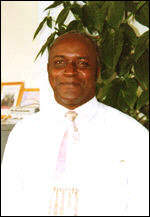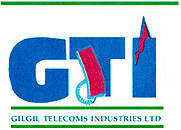
|
 | 
Interview with:
Mr Gabriel Tanyasis,
Managing Director
Nairobi, June 3rd 1999
Contact
Postal address: P.O.Box 250, Gilgil, Kenya.
Visiting address: Off Nairobi-Nakuru Rd, Gilgil Town.
Tel : +254 (367) 5248 / +254 (367) 2011
+254 (367) 2053
Fax : +254 (367) 5405
E-mail : gti@net2000ke.com
|
Gilgil Telecommunications was established in the late 1980's. Could you give us a brief overview of your Company?
Gilgil Telecommunications Industries or GTI as it is known, was established in late 1988 as a department of Kenya Posts and Telecommunications (KP&TC), aimed at starting an assembly facility and transferring telecommunications technology to Kenya, and creating employment. It is wholly owned by KP&TC.
In 1993 we were given autonomy to operate as we deemed correct, and we are now operating on a commercial basis. Initially, we started assembling simple telephones as well as telecommunications equipment such as metallic letter boxes which are also exported to Uganda and Tanzania, telephone booths, office furniture and other support equipment to the postal department. We have introduced various technologies such as computer systems and most of the peripherals, that go along with them and have come up with more intricate telecommunication equipment such as automatic switchboards (PABX), public switches, the wireless local loop etc. Telecommunications industry in the world goes on changing, evolving at a very rapid rate; GTI is determined to involve herself with the latest state-of-the-art technology to remain in pace.
We have also joined hands with international companies, like Ericsson of Italy in the production of switching equipment. Our way forward is to enter into joint ventures with re-knowned Telecom operators.
With KP&TC splitting into three separate companies, in the month of July 1999, Gilgil is initially going to be under one of the new companies named Telkom Kenya. The future placement of Gilgil will then be determined by what happens within Telkom Kenya. We will however keep on playing a major role in terms of supply of equipment to the liberalized market, which means not only Kenya, but also the entire East African Region and the COMESA region. GTI aims to be a market leader in the region.
In addition we have a strong collaboration with Jomo Kenyatta University regarding technology research, and the government and KP&TC offer us very much support.
What is the present share-holding structure of your company and what is the expected further shareholding at GTI after the privatization of your parent company, KP&TC? Will KP&TC sell its shareholding of Gilgil Telecom (GTI)?
Some shares have to be sold one way or the other, there has to be some privatization. Meanwhile, what is being done is to make this place as attractive to investors as possible before going on the Stock Market Exchange. Even with the privatization, however, I think GTI needs a lot more funds from the government for support, especially in research. Privatization will of course come eventually to bring in expertise and know-how, which is the only way forward.
Erigtel (Ericson Gilgil Telecoms) is a joint partnership between GTI and Ericsson. How did the partnership start and what have you accomplished so far?
The partnership was based on Technological transfer as well as to tap the existing market (KPTC). To date Erigtel has already installed 25,000 lines and we plan to manufacture 66,000 lines in this financial year. Quite a number of international companies have made inquiries, both from the Far East and Western countries with whom we would be more than willing to do business if there was a mutual comfort with the current networks. Under the Erigtel project GTI boasts advanced technology and capacity to supply and support the latest state-of-the-art public exchange. Our customer (KP&TC) turned around the confidence of its customers after the installation of AXE10 public switch. | What markets do you cater to? Is it mainly local or are you also aiming at international markets such as the USA?
The biggest concentration is within Kenya. We have had business with Tanzania, where we have 400 letter boxes. We have also exported telephones and switchboards to Uganda. What we are trying to do is to have agents in those countries. We already have agents in Tanzania, Uganda and Zambia, but what we are trying to do is to seek the assistance of our Trade Attachés within the E.A.Cooperation area & COMESA region as facilitators of trade.
We are trying to spread outside, which is why we have attended various exhibitions, in Egypt, South Africa, Zambia and Zimbabwe.
Our strategy now is to try as much as possible to emphasize on the marketing strategies in the COMESA region. We have not yet ventured outside Africa and we want to concentrate in East and Central Africa, especially in telecommunications equipment, transmission poles and accessories. We have had inquiries from very many countries, e.g. the Far East, Middle East, Senegal, etc. In our early establishment we managed to sell some magneto telephone equipment to Senegal.
What do you think is your main competitive advantage?
One of the advantages we have is our after sales service. Cheap imports have flooded the market, but they have no after-sales support. With our equipment, you can always come back for after-sales service. We offer equipment that is reliable. This is our biggest asset. We are available 24 hours, 7 days a week now. The situation is changing and the people find it better to come and buy equipment from us.
Have you been granted any quality standard awards?
We are the main manufacturers of transmission poles in this country. The Kenya Bureau of Standards awarded this product a Diamond mark of quality. For about one and a half years, we undertook a project to certify our production processes under the international standards quality management systems and we were awarded the ISO-9002 certificate in 1998. This is to mean that all our processes are certified. We undergo surveillance visits by quality auditors from the Kenya Bureau of Standards to ensure maintenance of the certified recognized quality standards. G.T.I. is therefore, confident to compete on the international market. We intend to pursue ISO 9001 and so on.
Would you please give us some figures on your company ?
Our workforce is about 400 people. Turnover is around Ksh 180 million, which is about US$ 2.5 million. We are sharing the Kenyan market with everyone else, but we have been able to capture around 50% of the telecommunications market.
What is your final message to our readers?
I think Kenya is a place to which investors should come and see what we can do together. As I said, there are so many openings today in the world of telecommunications that people should come and collaborate with us. They should take advantage of the potential Kenya has especially in this sector. |
|
© World INvestment NEws, 1999.
This is the electronic edition of the special country report on Kenya published in Forbes Global Magazine.
November 29th 1999 Issue.
Developed by AgenciaE.Tv |
|
| | | | |
| |
|

